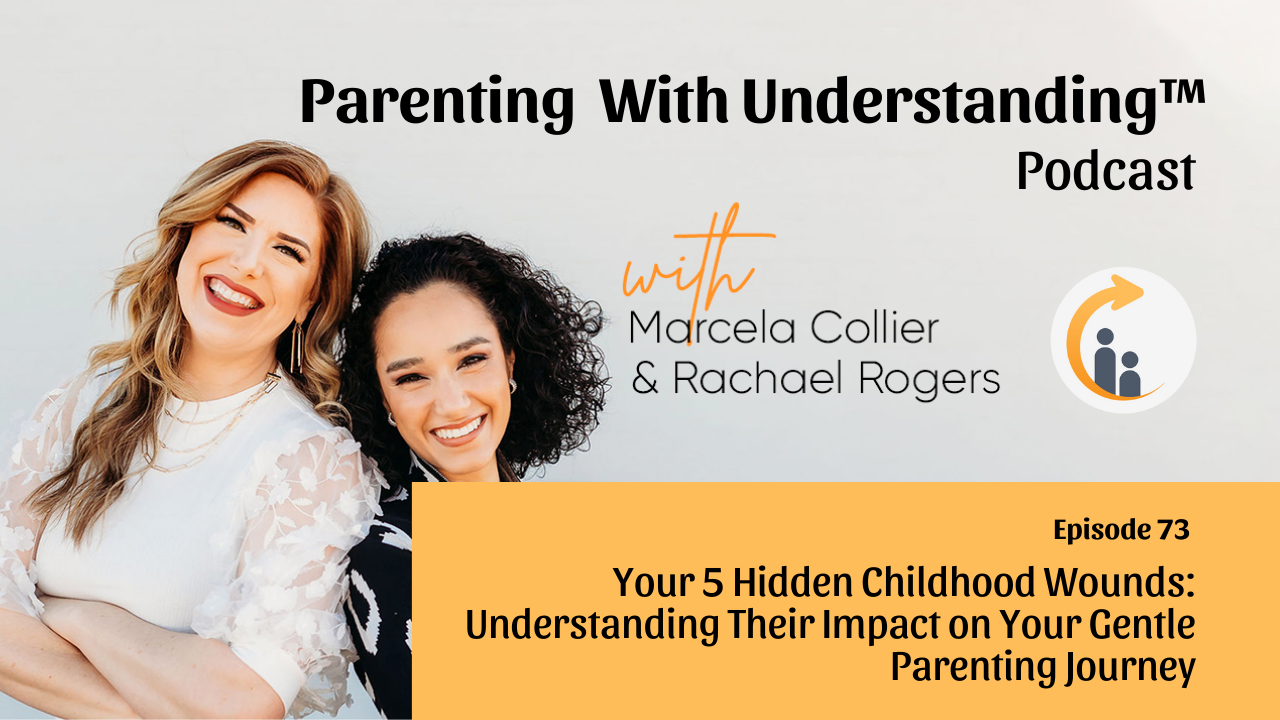Epi #73. Your 5 Hidden Childhood Wounds: Understanding Their Impact on Your Gentle Parenting Journey
Aug 15, 2023
Raising children in a gentle, nurturing environment is a dream many parents share.
Aspirations of creating a happy, fun, and connected home, fostering open communication, and nurturing a loving relationship between parent and child fill your heart.
Yet, despite your extensive knowledge from gentle parenting books and dedication to watching countless parenting videos, you still find yourself battling with your temper and reactions, a shadow from the past that seems to loom large.
The very root of these unexpected outbursts and reactions might be in the hidden wounds from your childhood.
But take heart, recognizing and understanding these wounds is your gateway to healing and creating the nurturing environment you deeply desire.
1. Rejection
What it looks like:
An underlying fear of being unlovable or feelings of unworthiness often point toward experiences of rejection in childhood. Such emotions might arise from being frequently dismissed or feeling overlooked.
How it affects your parenting:
In an attempt to shield your child from similar experiences, you might become excessively protective or, conversely, inadvertently distant.
This could contribute to those moments when your child resists cooperation, sensing your anxiety or distance.
Solution:
- Fostering an environment of acceptance is key.
- Encourage open dialogues with your child, emphasizing that their feelings and emotions are valid.
- Building this bridge of trust and understanding can pave the way for a more cooperative relationship.
- Being aware that the source of your triggers is not your child but your core wound of rejection.
2. Abandonment
What it looks like:
Persistent feelings of loneliness, or an overwhelming fear of being left alone, often spring from past experiences of abandonment.
How it affects your parenting:
Your past might prompt you to be always present, leading to a child who becomes overly reliant.
On the flip side, there might be instances of unintentional emotional withdrawal, a protective mechanism from past pain.
Solution:
Balance is essential.
Give your child space to grow while reassuring them of your unwavering presence.
If necessary, seeking therapy can be a powerful step in healing and understanding these feelings and accessing parenting coaching to rewire how you relate to your child.
3. Humiliation
What it looks like:
Deep-seated fears of criticism or an aversion to making mistakes may hint at past experiences of humiliation or ridicule.
How it affects your parenting:
This wound might propel you to unintentionally nitpick at your child's actions or dissuade them from new experiences out of fear of failure or judgment.
Solution:
Celebrate efforts, not just results.
Encouraging a growth mindset and resilience will benefit your child and help you view setbacks through a compassionate lens.
To view your public embarrassment not as a feeling caused by your child’s behaviors but as the fear of judgment fed by your core wound of humiliation.
4. Betrayal
What it looks like:
A deep mistrust, perhaps arising from broken promises or unreliable caregivers during childhood.
How it affects your parenting:
There might be a constant underlying doubt regarding your child's actions or intentions, potentially hindering their sense of independence and self-confidence.
Ex. You ask your child multiple times if they did something without trusting their word.
Solution:
Healing begins with rebuilding trust.
Setting clear, fair boundaries and consistently upholding them can be a solid foundation.
Over time, this fosters trust in the parent-child relationship.
Allow your child space to do things independently without constantly checking on their work.
5. Injustice
What it looks like:
A pervasive feeling of being unfairly treated, stemming perhaps from being misunderstood or misjudged in childhood.
How it affects your parenting:
The ripple effect might make you either overly strict or excessively lenient as you swing between seeking justice and avoiding potential injustices for your child.
Ex. You might handle sibling conflict by choosing sides, usually by selecting the side of the younger or weaker child and not seeing the other child’s needs.
Solution:
Be open to hearing your child's side of the story and provide them with a platform to express their feelings.
Empower Your Parenting Journey: Hope Awaits
Understanding these childhood wounds isn't about dwelling on the past but embracing the promise of the future.
Every day is a fresh opportunity to rewrite the narrative for yourself and your children.
Are you seeking tangible insights, personal stories, and actionable strategies?
Dive deep into our latest episode of The Parenting With Understanding Podcast, where we unpack these themes further.
Ready for transformative growth?
Sign up for our free class. https://masterclass.hicparenting.com/the-parenting-tools
✅ Dive into tools designed to heal your reactivity, guiding you towards peaceful, present parenting.
✅ Leave behind the overwhelm, guilt, and fear.
✅ Begin your journey toward a calm, connected parenting experience.



